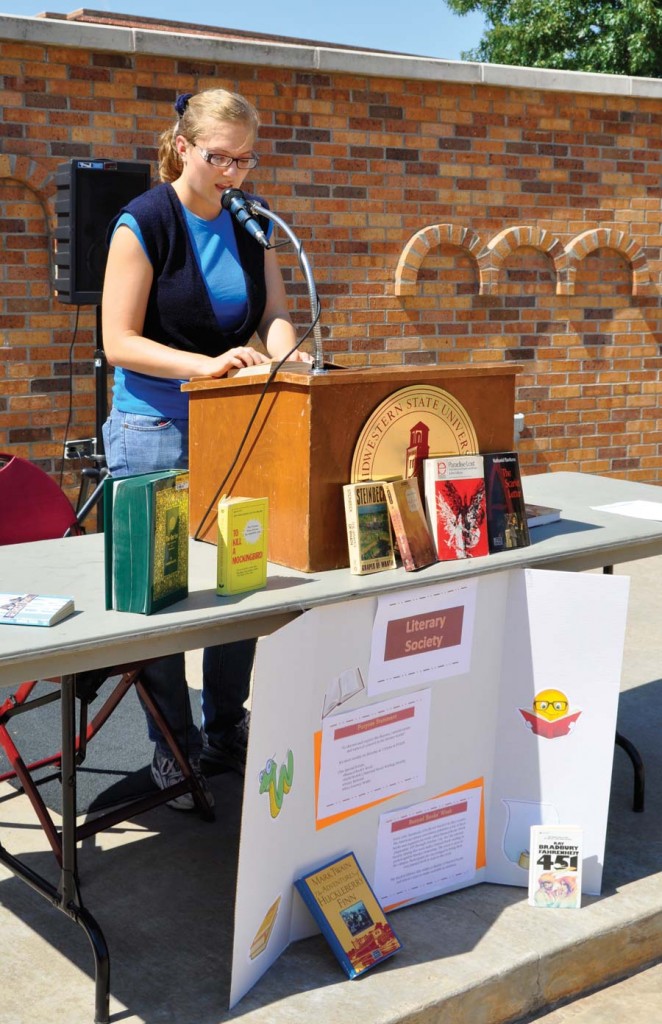
To Kill a Mockingbird is one of Breanne Sill’s favorite books.
Her favorite novel is also on the Banned and Challenged books according to the American Library Association (ALA).
Tuesday began the annual Book Banning and Censorship Protest at Sunwatcher Plaza, sponsored by the Literary Society, Sigma Tau Delta and English Honor Society.
Students were able to read out passages from their favorite banned books along with explaining why the book should not be on the list.
Yearly, books get banned for language, explicit content, religious or anti-religious messages, and the author’s personal life.
Even though Sill understands why To Kill a Mockingbird’s was banned, she said no book deserves to be banned.
“(The novel) teaches an important lesson about the past problem of racism and equality in this country from a child’s perspective,” Sill said. “There are hard lessons to learn and accept, and they are still relevant today.”
Language is the reason the novel by Harper Lee is on the banned book list.
“To Kill a Mockingbird is an important addition to literature education,” Sill said. “Teachers can use the novel to teach children the harms of lies, bullying, corruption, racism and the importance of equality, integrity, and justice while introducing their students to profound metaphors and symbolism.”
Banning classics not only bans a part of history, but also bans humanity, Sill said.
“Most books that tend to be banned happen to be classic literature that conveys an idea that transcends the time it was written and is still considered relevant to today’s audiences,” Sill said. “Books have important moralistic value that can help readers look at the world with new eyes and help them grow in appreciation for things that they may not have otherwise cared about.”
The banning of Stephanie Myer’s best seller, Twilight, is on the top-ten list.
Sill argues banning contemporary literature hinders young readers from ever picking up a book outside of the classroom.
“One book can turn a child into an avid reader,” Sill said. “Reading is such a necessary skill. Students who read frequently have better analytical and writing skills than children who only read for class assignments. No matter the quality of the literature, children and young adults need to read so they are better prepared for life.”
Literary Society Advisor Kirsten Lodge said banning books leads to the persecution of writers, and in some cases to their imprisonment and even death.
“It is evident that the struggle against censorship is a struggle both for human rights and for world culture, and there is no better reason to get involved to end censorship today,” Lodge said. “Even Huckleberry Finn and The Catcher in the Rye have been banned. No one has the right to decide what we should and should not read.”
Lodge’s favorite banned works include the poetry of Russian modernists writing between the 1890s and the 1920s. These works were banned from the 30s and the 60s.
“When they were finally permitted to appear in print, they had an incredible impact on Russian literature,” Lodge said. “Young people discovered a whole world they never knew existed. This revitalized Russian literature, if only for a time, until the censors cracked down once again.”
Dr. Peter Fields is the advisor of Sigma Tau Delta and enjoyed the performance aspect of the book ban readings.
“Censorship at best is absurd as in the case of anyone who would censor a book in the Twilight series, which is exceptionally and notably chaste,” Fields said. “Censorship, more seriously, distorts history as with those who want to clean up the language of Mark Twain’s Huckleberry Finn. Finally, censorship at its worst robs us of something provocative and profound.”
The goal is not simply to read aloud from a book but to connect dynamically with the masses.
“Students should care about censorship issues for the same reasons they should care about their right of free speech,” Sill said. “Books are a form of expression. They can give a lot of detail about a human behavior, a specific culture, or time period that can be missed from just reading a history book. Banning that expression is like banning a part of history.”
During the event Tuesday afternoon, three protesters also used their first amendment rights, holding up posters with statements such as, “True Christians only touch a Harry Potter book when they are throwing it onto a fire.”
The Harry Potter books were banned in 2001 and 2002.
Students will continue to read their favorite banned books Wednesday from 1 p.m. to 3 p.m. at Sunwatcher Plaza.
2010 Challenged Books
10. Twilight, by Stephenie Meyer
9. Revolutionary Voices, edited by Amy Sonnie
8. Nickel and Dimed, by Barbara Ehrenreich
7. What My Mother Doesn’t Know, by Sonya Sones
6. Lush, by Natasha Friend
5. The Hunger Games, by Suzanne Collins
4. Crank, by Ellen Hopkins
3. Brave New World, by Aldous Huxley
2. The Absolutely True Diary of a Part-Time Indian, by Sherman Alexie
1. And Tango Makes Three, by Peter Parnell and Justin Richardson














